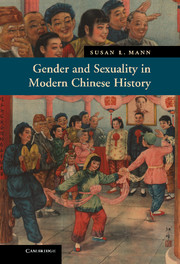Book contents
- Frontmatter
- Contents
- Figures
- Acknowledgments
- Preface: Does Sex Have a History?
- Introduction: The cloistered lady and the bare stick
- Part I Gender, Sexuality, and the State
- PART II GENDER, SEXUALITY, AND THE BODY
- Part III Gender, Sexuality, and the Other
- 7 Same-sex relationships and transgendered performance
- 8 Sexuality in the creative imagination
- 9 Sexuality and the Other
- Conclusion: Gender, sexuality, and citizenship
- Afterword: Gender and sexuality: useful categories of historical analysis?
- Permissions
- References
- Index
9 - Sexuality and the Other
from Part III - Gender, Sexuality, and the Other
Published online by Cambridge University Press: 05 June 2012
- Frontmatter
- Contents
- Figures
- Acknowledgments
- Preface: Does Sex Have a History?
- Introduction: The cloistered lady and the bare stick
- Part I Gender, Sexuality, and the State
- PART II GENDER, SEXUALITY, AND THE BODY
- Part III Gender, Sexuality, and the Other
- 7 Same-sex relationships and transgendered performance
- 8 Sexuality in the creative imagination
- 9 Sexuality and the Other
- Conclusion: Gender, sexuality, and citizenship
- Afterword: Gender and sexuality: useful categories of historical analysis?
- Permissions
- References
- Index
Summary
The People's Government is really something No longer do we comb up our hair but wear it in a bun With our headdress removed, we are free and easy With flowers in our hair, oh so pretty. Local customs are really no good The headdress and long vest, no sleeves for one's arms In this new era we must change our style Three bamboo sticks inside the headdress A headscarf made from an array of colors It's unattractive and must be reformed.
Propaganda folksong, Hui’an, Fujian (Sara Friedman 2006:259–260)His clothing was crisply ironed and neat from top to bottom, and he’d applied lots of hair gel, too, so he looked like a brand-new, furled umbrella. Those eyes of his seemed like the epicenter of his body and all his energy emanated from there. A white man's eyes.
Wei Hui, Shanghai Baby (2001:29–30)Encountering an unfamiliar culture, the outsider looks for difference. Nowhere is difference more easily apprehended than in the arenas of gender and sexuality. In any cross-cultural encounter, gender roles and sexuality supply a medium for clarifying and symbolizing the essential cultural differences that separate “us” from “them.” So sex – that most intimate of acts – is ironically one of the first things we think of when we imagine the remote Other. Imperial expansion aimed at economic or political conquest therefore also, and inevitably, negotiates gender relations (Stoler 1991). In the history of Western colonialism, the gender models at the civilizing center were binary and heteronormative. Encountering Chinese culture, Europeans asked: What makes women women, and what makes men men, in this place? The civilizing projects of China's own late imperial government, and of China's contemporary Communist state, posed the same questions on the borderlands and in China's heartland itself. The effect of civilizing projects, in general, has been to masculinize the dominant metropole and feminize the colonized Other, as in Wei Hui's Shanghai Baby, quoted above. But gender bending and confusion can also arise. Who is liberated, who is modern, who is moral, who is perverse? Cross-cultural encounters also pose these questions and demand answers.
- Type
- Chapter
- Information
- Gender and Sexuality in Modern Chinese History , pp. 169 - 185Publisher: Cambridge University PressPrint publication year: 2011



